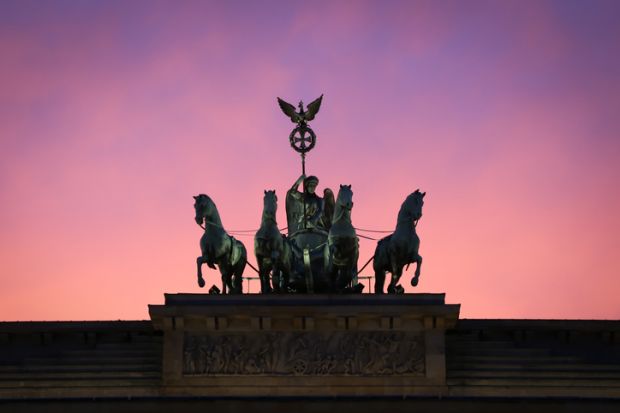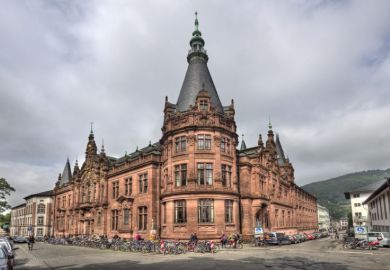Texts from thinkers such as Karl Marx, John Locke and Jean-Jacques Rousseau should be mandatory for all who study at the network of “European universities” proposed by Emmanuel Macron, according to the new president of the German Rectors’ Conference (HRK).
Peter-André Alt, a scholar of German literature ranging from Schiller to Kafka who leaves Berlin’s Free University after eight years at the helm, steps into his new role leading German universities just as they are confronted by more uncertainty than they have experienced for years.
He will quickly have to get to grips with, among other things, a battle with the world’s largest publisher; a new German science minister who has warned that the days of steadily rising budgets are over; and the stress and strain of trying to keep the 268 institutions that are part of the HRK singing from the same hymn sheet.
But speaking to Times Higher Education in his new central Berlin office on his second day in the job, what seems to most excite Professor Alt is the challenge of creating “European universities”: next month he will deliver a speech in Cambridge on the subject.
Since Mr Macron, the French president, last September proposed a network of at least 20 designated European universities in a bid to shore up European identity among the young, universities and the European Commission have scrambled to flesh out his idea; there are now at least two sets of universities that have created alliances in response.
But for Professor Alt, the response so far has been “typical” of the European Union – a “technical” focus on how to organise these networks, who should be allowed in, and what funding should be available.
More important is that these “European universities” follow a “joint, a mutual, idea”, he said. “This idea should be defined by a European canon of books and ideas and concepts,” he argued. “I think this is what was missing in this discussion.”
Students should be required to read canonical texts – albeit short ones – from the continent’s greatest thinkers. “Why shouldn’t the European student read The Communist Manifesto?” he asked.
Who should be in the canon? In addition to Karl Marx, Professor Alt mentioned Thomas Hobbes, John Locke, Montesquieu, Jean-Jacques Rousseau, Immanuel Kant, Max Weber and Sigmund Freud, although he acknowledged that this was shaping up to be a “very German” list – it would have to include Spanish and Italian authors, too.
Closer to home, Professor Alt must secure continued support for German universities after a funding deal paying for extra student places runs out in 2020. The new science minister, Anja Karliczek, has unnerved rectors by saying that it is time to “pause and consolidate” after years of steady budget increases. Professor Alt has accepted that at least some money in the future will come with new strings attached, meaning that German universities will have to prove like never before that they are not neglecting teaching quality.
One change might involve asking academic job applicants to teach before a panel “so that the [selection] committee can get an impression of how good the teaching quality was”, he said.
But implementing this idea – as Professor Alt did in most departments when he was head of the Free University – might be stiffly resisted in a system where an applicant’s research record is often the deciding factor. “Many universities are very reluctant to introduce such a component,” he said. “There is not a broad consensus on that.”
The likes of the University of Cambridge or Harvard University need not fear German universities displacing them in global rankings, as Professor Alt believes that the country should keep its system of “distributed excellence” rather than adopt the Anglo-American model of hyper-concentrating resources into a few institutions.
This is despite the federal government’s efforts to promote differentiation through the Excellence Initiative, which rewards select universities with more money and status.
“The French Revolution has been realised in the system of German higher education,” he said. It has “liberty” as well as “equality”, although “fraternity is missing a little bit”, Professor Alt joked.
Too many representatives of Germany’s various types of universities say “we are covering everything”, researching everything from nanomaterials to archaeology, he warned, and there was a risk that German universities would try to do everything – and end up doing nothing particularly well.
“In the end, they [German universities] are not able to compete with the top-level Ivy League universities” in the upper echelons of global university rankings, he said, although they still had a very strong presence outside the top 30 places.
POSTSCRIPT:
Print headline: Full Marx: ‘European universities’ must build on continental canon
Register to continue
Why register?
- Registration is free and only takes a moment
- Once registered, you can read 3 articles a month
- Sign up for our newsletter
Subscribe
Or subscribe for unlimited access to:
- Unlimited access to news, views, insights & reviews
- Digital editions
- Digital access to THE’s university and college rankings analysis
Already registered or a current subscriber?








